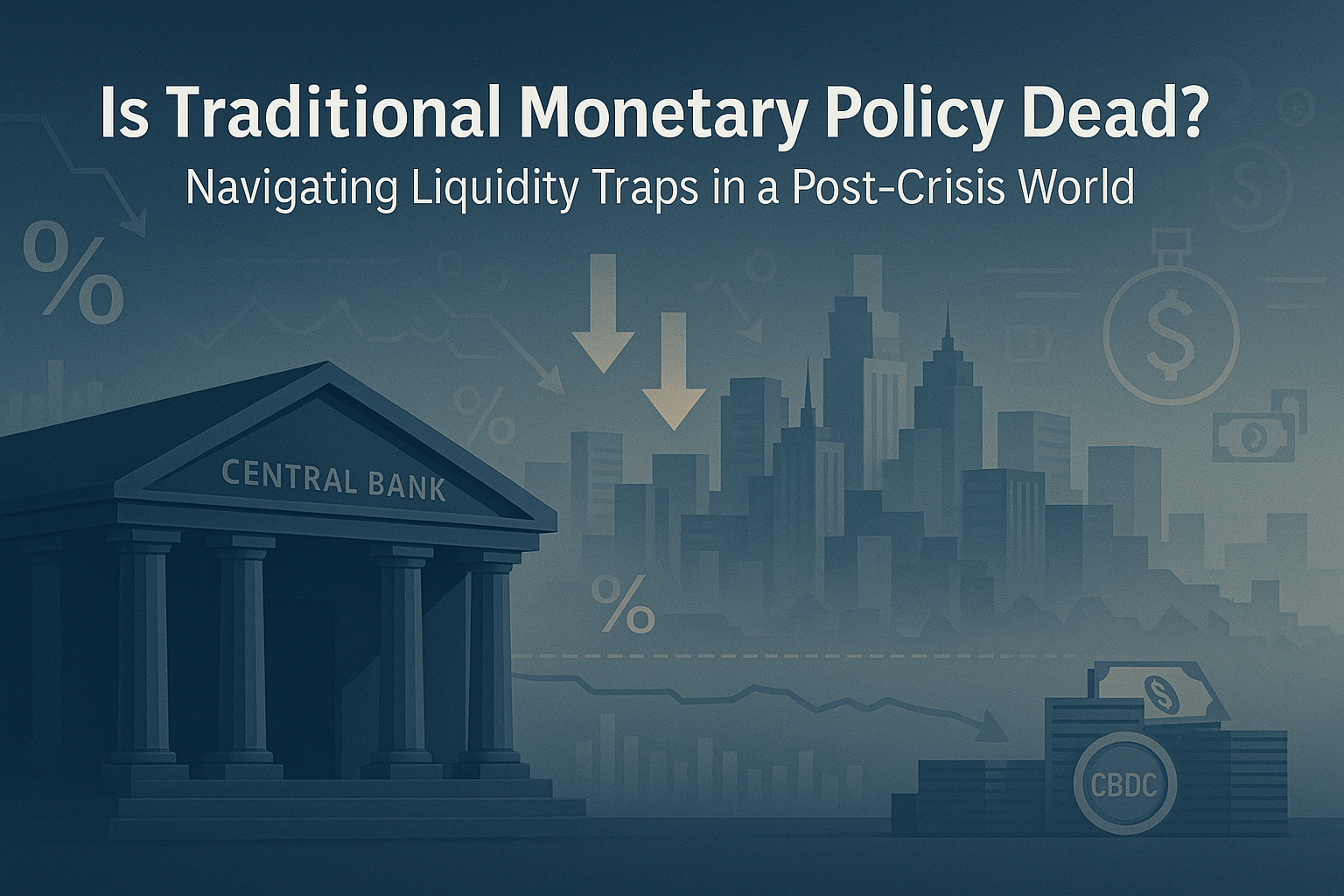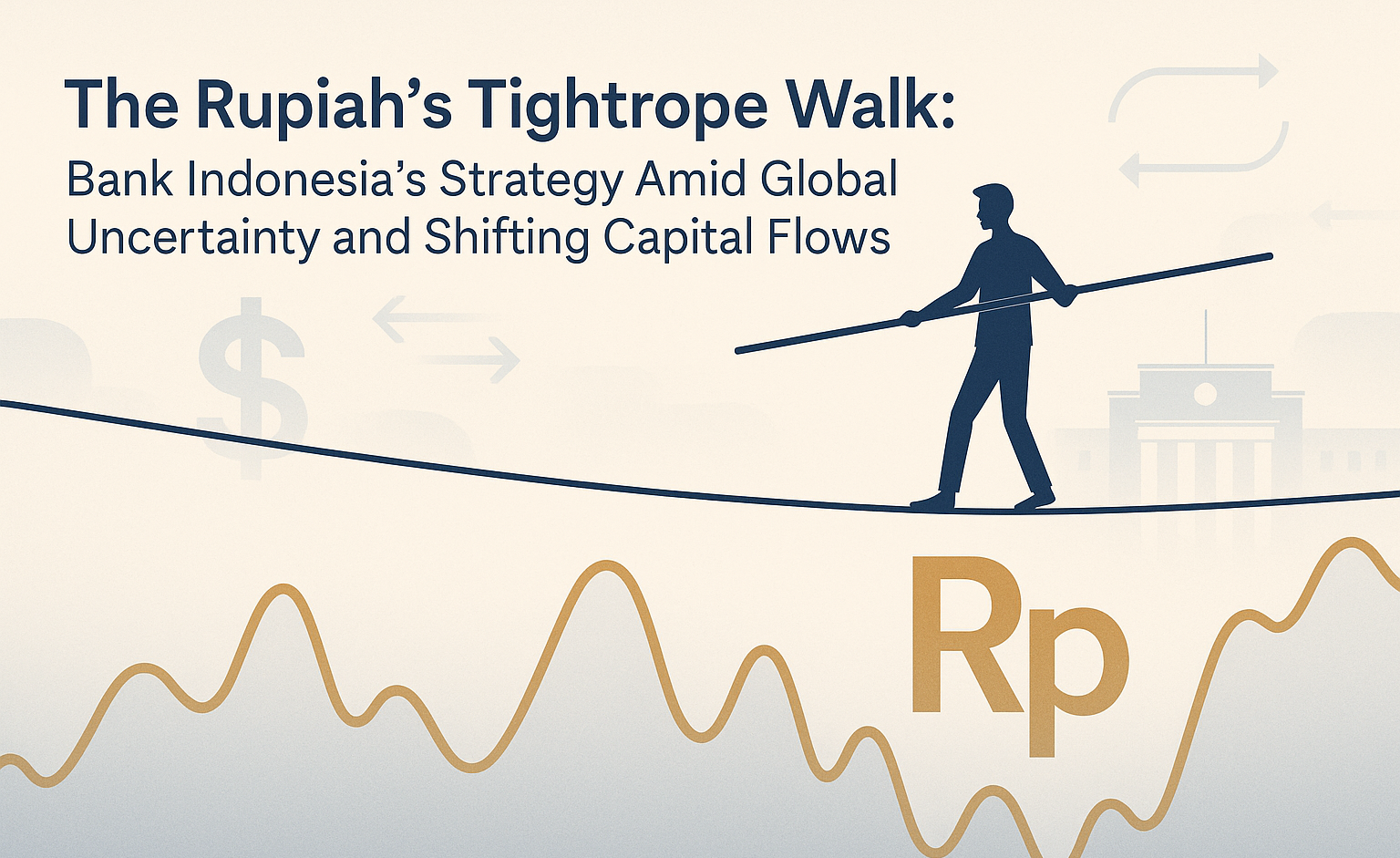Welcome to FinBridge
Your trusted partner for financial insights, education, and planning. We help individuals and businesses make informed financial decisions.
FinBridge Advisory
Empowering policies, business, and investments with intelligent insights.
Get Advisory →Markets Overview
Latest Articles

The Hidden Trigger: How Japan's Carry Trade Bubble Could Unleash the Next Global Shock
Japan's transition from the world's primary source of cheap funding to monetary normalization represents the most significant underpriced tail risk in global financial markets. After three decades of ultra-accommodative policy that transformed the yen into the foundation of global leverage, the Bank of Japan (BOJ) faces mounting pressure to normalize rates amid persistent inflation above target and political backlash against currency weakness. This policy pivot threatens to trigger an unwinding of carry trade positions estimated between $1-4 trillion, with the potential to destabilize markets far beyond traditional currency channels. The systemic importance of this risk stems from three interconnected factors. First, Japan's unique position as the world's largest creditor nation with $3.4 trillion in net foreign assets means that capital repatriation would drain liquidity from global markets on an unprecedented scale. Second, the multi decade stability of Japan's zero-rate policy has created deeply embedded market structures and risk models that systematically underestimate the probability and impact of a regime change. Third, modern financial markets have created hidden linkages between yen funding and seemingly unrelated asset classes, from U.S. technology stocks to emerging market debt, amplifying contagion channels. The August 2024 episode provided a preview of this vulnerability. A modest 15 basis point BOJ rate hike triggered a 10% yen appreciation, a 12% Nikkei plunge, and synchronized selling across global risk assets. Critically, this unwinding was only partial speculative positioning data suggests 50-60% of positions remained intact, leaving substantial dry powder for future volatility. Unlike the Swiss franc, which serves a niche role constrained by active central bank intervention and limited market depth, the yen's systemic importance makes its normalization a global event that no single policy authority can control

Indonesia's Downstream Nickel Strategy: Battery Supply Chain Sovereignty or Resource Trap?
The article critically examines Indonesia’s ambitious downstream nickel strategy, which aims to transform the country from a raw material exporter into a key player in the global electric vehicle and battery supply chain. While Indonesia has significantly increased its nickel export value and attracted massive foreign investment particularly from China, the strategy faces major challenges, including environmental degradation, technological dependency, inequitable benefit distribution, and potential resource depletion. The analysis raises the question of whether Indonesia is truly achieving economic sovereignty or falling into a resource trap, urging a shift toward cleaner technologies, stronger domestic capacity, and more equitable, sustainable industrial development.

No One Wins Forever: Unpacking Game Theory and the Real Rules of Financial Competition
This article explores how game theory reveals the hidden logic behind competition in modern markets, showing that no business, no matter how dominant can win forever. Using Southeast Asian case studies like e-commerce price wars and ride-hailing battles, it explains how every strategic move triggers reactions, leading to cycles of adaptation, temporary advantage, and eventual equilibrium. The article unpacks practical concepts like the Red Queen Effect, Nash Equilibrium, the Prisoner’s Dilemma, first-mover advantage, and kingmaker dynamics offering actionable insights for investors, entrepreneurs, and decision-makers on how to survive and thrive in an ever-shifting business landscape where resilience, adaptation, and strategic thinking matter more than any single “winning” move.
Economics

Is Traditional Monetary Policy Dead? Navigating Liquidity Traps in a Post-Crisis World
This article critically examines the diminishing effectiveness of traditional monetary policy tools particularly interest rate cuts in the face of persistent economic stagnation and structural challenges following the 2008 Global Financial Crisis. It explores the emergence of liquidity traps, where near-zero interest rates fail to stimulate investment or consumption, and introduces the concept of shadow rates as a more accurate reflection of monetary accommodation under unconventional policy regimes. The piece discusses the rise and limitations of quantitative easing (QE), highlighting its unequal impacts on asset prices versus the real economy. It contrasts the policy responses of the U.S. Federal Reserve and Bank Indonesia, emphasizing the need for tailored, pragmatic strategies in emerging markets. The article concludes by advocating for a multidimensional monetary policy framework that incorporates tools like yield curve control, central bank digital currencies (CBDCs), and closer fiscal-monetary coordination, arguing that adaptation not abandonment of central banking is essential in the post-crisis world.

This provides an analysis of Bank Indonesia's strategic response to complex global conditions in early 2025, highlighting its priority on Rupiah stability amid uncertainties from U.S. monetary policy shifts, escalating trade tensions, and volatile capital flows. Bank Indonesia maintained its benchmark rate (BI-7DRRR) at 5.75% since January 2025, signaling a cautious approach focused primarily on exchange rate stability. Despite proactive interventions, the Rupiah faced persistent depreciation pressure driven by portfolio outflows of USD 2.8 billion amid global market volatility linked to U.S. trade policies. Interestingly, foreign exchange reserves reached a record high (USD 157.1 billion), largely supported by government loans and BI’s issuance of market instruments like SRBI and SVBI. Nonetheless, Indonesia's external position showed strains, with a widening current account deficit in 2024, though balanced by financial inflows. Inflation remained subdued domestically, but BI adjusted its growth forecast downward for 2025 due to global uncertainties, particularly from U.S.-China tensions. Looking ahead, BI’s policy will remain data-dependent, closely monitoring Rupiah stability, global market conditions, and capital flow dynamics.

Real Rate Matters: Why Inflation and Nominal Rates Often Mislead Investors
This article highlights why focusing on nominal interest rates alone can lead to major investment mistakes and policy errors. The real interest rate calculated by subtracting inflation from nominal rates offers a more accurate measure of monetary conditions and true investment returns. Drawing from historical crises in the US, Turkey, and Indonesia, the research shows how negative real rates can fuel inflation, trigger capital flight, and destabilize currencies, even when nominal rates appear high. The Fisher Equation serves as the key framework for understanding this relationship, emphasizing the role of inflation expectations and central bank credibility. As of 2025, global real rate conditions remain highly uneven across regions, shaping capital flows, currency stability, and asset valuations. The article outlines three potential future scenarios through 2030 from successful disinflation to persistent inflation shocks and policy mistakes. Understanding real rates is critical for informed portfolio decisions across bonds, equities, currencies, and commodities. This piece provides investors and policymakers with the insights needed to navigate monetary uncertainty and avoid the trap of headline nominal rates.
Education

Smart Investing Isn't About Being Right, It's About Protecting Your Capital
Smart investing isn’t about predicting the market or being right all the time, it’s about protecting your capital and staying in the game. The article breaks down how overconfidence, psychological biases, and obsession with being “smart” often lead to costly mistakes, while true long-term success comes from risk management, capital preservation, and building disciplined systems. In investing, survival not ego is the real alpha.

Decoding Market Dynamics: Navigating the Interplay Between Volume, Liquidity, and Market Making
This article explores how the combination of volume and liquidity defines four distinct market environments, and how market makers act as central players in maintaining, exploiting, or stabilizing these conditions. The insights are tailored for traders, analysts, institutional investors, and system designers seeking to understand the microstructure of financial markets from a functional and strategic lens.

Decoding Market's DNA: From Adam Smith to Auction Market and the Value Area
This article examines the intellectual progression from classical economic theory to modern market microstructure analysis, providing a framework for understanding market behavior that goes beyond surface-level technical analysis
Industries

Indonesia's Downstream Nickel Strategy: Battery Supply Chain Sovereignty or Resource Trap?
The article critically examines Indonesia’s ambitious downstream nickel strategy, which aims to transform the country from a raw material exporter into a key player in the global electric vehicle and battery supply chain. While Indonesia has significantly increased its nickel export value and attracted massive foreign investment particularly from China, the strategy faces major challenges, including environmental degradation, technological dependency, inequitable benefit distribution, and potential resource depletion. The analysis raises the question of whether Indonesia is truly achieving economic sovereignty or falling into a resource trap, urging a shift toward cleaner technologies, stronger domestic capacity, and more equitable, sustainable industrial development.

The Role of Liquefied Natural Gas in the Global Energy Transition
This article provides a comprehensive analysis of the evolving role of Liquefied Natural Gas (LNG) in the global energy transition, highlighting its dual nature as both an enabler of energy security and a source of climate risk. LNG has emerged as a pivotal “bridge fuel,” supporting nations in diversifying their energy mix and stabilizing grids as they integrate more renewables, especially amid geopolitical upheavals like the Russia-Ukraine war. The article details the technological, geopolitical, and financial dynamics driving LNG demand, with a special focus on Europe’s pivot away from Russian pipeline gas and Southeast Asia’s surging consumption. While LNG offers operational flexibility and emits less CO₂ than coal or oil, its climate benefits are undermined by methane leakage and the risk of locking in long-term fossil fuel dependence through expensive infrastructure investments. The analysis concludes that LNG’s future as a sustainable energy solution hinges on aggressive methane mitigation, responsible investment, and alignment with Environmental, Social, and Governance (ESG) standards otherwise, its continued expansion may impede global decarbonization goals rather than facilitate them.

Beyond Marketplaces: Navigating the Future of E-commerce Amid High Fees and Talent Inflation
This article is a strategic analysis of Southeast Asia’s shifting e-commerce landscape, focusing on the growing challenges faced by SMEs and startups due to rising marketplace fees and inflated tech talent costs. The article critically examines how platforms like Shopee, Tokopedia, and Amazon have evolved from enablers into margin-compressing ecosystems, while also exposing the inefficiencies of overfunded startup cultures driven by unsustainable hiring practices. In response, it outlines actionable strategies such as embracing Direct-to-Consumer (D2C) models, adopting omnichannel approaches, optimizing cost structures, and implementing competency-based recruitment. With projections showing Southeast Asia’s e-commerce GMV doubling by 2030, the article urges businesses to rethink their dependence on marketplaces, reclaim brand autonomy, and position themselves for long-term growth through agility, efficiency, and customer-centric innovation.
🧠 Insight

The Hidden Trigger: How Japan's Carry Trade Bubble Could Unleash the Next Global Shock
Japan's transition from the world's primary source of cheap funding to monetary normalization represents the most significant underpriced tail risk in global financial markets. After three decades of ultra-accommodative policy that transformed the yen into the foundation of global leverage, the Bank of Japan (BOJ) faces mounting pressure to normalize rates amid persistent inflation above target and political backlash against currency weakness. This policy pivot threatens to trigger an unwinding of carry trade positions estimated between $1-4 trillion, with the potential to destabilize markets far beyond traditional currency channels. The systemic importance of this risk stems from three interconnected factors. First, Japan's unique position as the world's largest creditor nation with $3.4 trillion in net foreign assets means that capital repatriation would drain liquidity from global markets on an unprecedented scale. Second, the multi decade stability of Japan's zero-rate policy has created deeply embedded market structures and risk models that systematically underestimate the probability and impact of a regime change. Third, modern financial markets have created hidden linkages between yen funding and seemingly unrelated asset classes, from U.S. technology stocks to emerging market debt, amplifying contagion channels. The August 2024 episode provided a preview of this vulnerability. A modest 15 basis point BOJ rate hike triggered a 10% yen appreciation, a 12% Nikkei plunge, and synchronized selling across global risk assets. Critically, this unwinding was only partial speculative positioning data suggests 50-60% of positions remained intact, leaving substantial dry powder for future volatility. Unlike the Swiss franc, which serves a niche role constrained by active central bank intervention and limited market depth, the yen's systemic importance makes its normalization a global event that no single policy authority can control

No One Wins Forever: Unpacking Game Theory and the Real Rules of Financial Competition
This article explores how game theory reveals the hidden logic behind competition in modern markets, showing that no business, no matter how dominant can win forever. Using Southeast Asian case studies like e-commerce price wars and ride-hailing battles, it explains how every strategic move triggers reactions, leading to cycles of adaptation, temporary advantage, and eventual equilibrium. The article unpacks practical concepts like the Red Queen Effect, Nash Equilibrium, the Prisoner’s Dilemma, first-mover advantage, and kingmaker dynamics offering actionable insights for investors, entrepreneurs, and decision-makers on how to survive and thrive in an ever-shifting business landscape where resilience, adaptation, and strategic thinking matter more than any single “winning” move.

Navigating Turbulence: Trump's Tariff Volatility Meets the Digital Dollar Revolution
This article analyzes the paradoxical financial environment of 2025, where erratic U.S. tariff policies under President Trump have triggered significant market volatility and disrupted global trade, especially impacting Asian economies. Simultaneously, the advancement of the GENIUS Act signals a transformative push toward regulated Treasury-backed stablecoins, promising to reinforce U.S. dollar dominance through digital currency innovation. This dual dynamic creates a complex interplay of risks and opportunities, urging Asian policymakers and investors to strategically navigate tariff-induced uncertainty while leveraging emerging digital financial technologies to foster economic resilience, financial inclusion, and technological leadership in a rapidly evolving global monetary landscape.